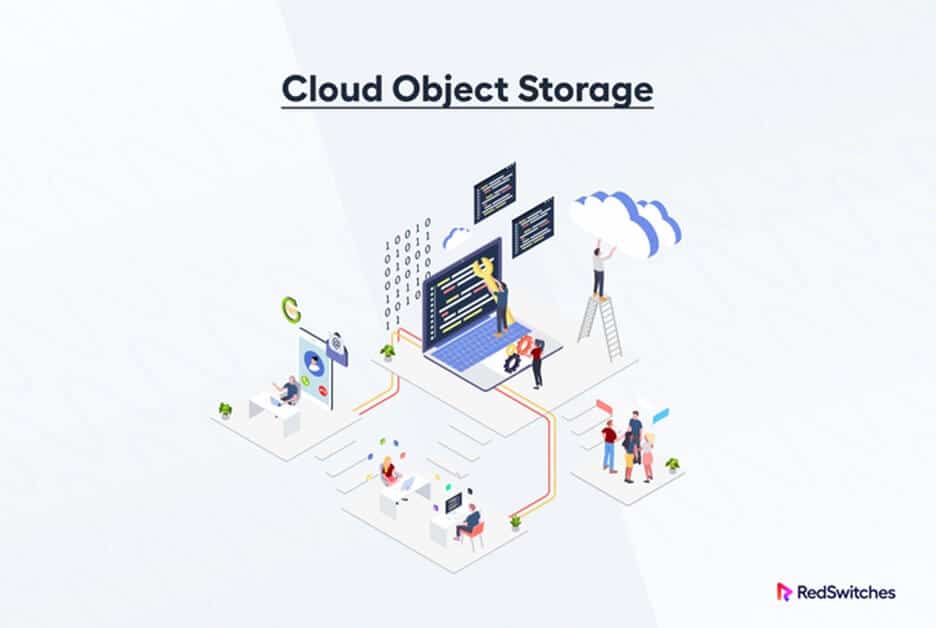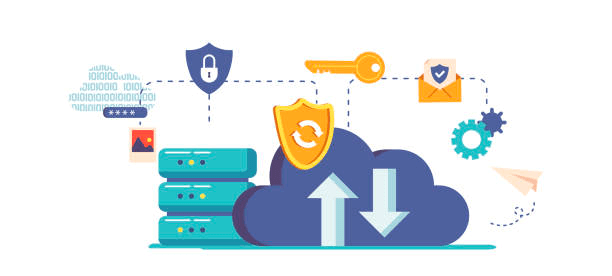As customer demand grows, businesses are up-scaling info-sharing. So what is the result? A rise in data usage and a need for efficient storage solutions. The question here is what is cloud object storage, and how is it the solution to today’s high-volume data demands?
Statistical facts from Fortune Business Insights show that the global cloud storage market is expected to grow to $376.37 billion by 2029. This analytical progress will occur at a CAGR of 24.0% between 2022 and 2029.
In light of the above statistical analysis, businesses will embrace the concept of Cloud Object Storage. Reliability and affordability are two unique benefits of this type of cloud storage. This storage solution allows businesses to access and manage their data from anywhere while benefiting from high scalability and flexibility.
In this guide for businesses, learn about What Object-based Cloud Storage is, its benefits, and how it compares to other storage solutions. Also, learn about the expertise of RedSwitches, a reputable cloud hosting provider that offers businesses secure and reliable cloud hosting services.
Table of Content
- What is Cloud Object Storage?
- Importance of Cloud Object Storage
- The Architecture of Object Storage
- Difference between Cloud Object Storage vs. Block Storage vs. File Storage
- Benefits of Object Storage
- Object Storage Examples
- Key Takeaways
- FAQs
What is Cloud Object Storage?
Cloud Object Storage is a type of cloud storage that manages data as objects rather than blocks or files. Object storage is excellent for storing significant amounts of unorganized data like images, videos, and audio files. This is because it makes accessing and retrieving your data accessible and efficient.
Cloud Object Storage stores data in buckets and assigns a unique identifier to each object. Businesses can access these objects from various locations with an internet connection, making it effortless to retrieve their data.
Cloud Object Storage is more scalable and cost-effective than traditional storage methods such as file or block storage. It allows businesses to pay only for their needed storage rather than investing in expensive hardware and infrastructure.
Cloud Object Storage also provides robust security measures to protect sensitive data, including encryption, access controls, and monitoring. This helps businesses comply with regulatory security standards and prevent financial loss due to data breaches.
Cloud Object Storage is a superb option for businesses to store and manage lots of unorganized data. This storage option is efficient and won’t break the bank. Also, it has more fantastic, reliable security features to ensure your data is kept safe compared to other cloud storage.
Importance of Cloud Object Storage
In today’s data-driven world, managing large amounts of data is crucial. This is where cloud object storage comes in, offering cost-effective, scalable, and secure storage solutions. In this section, you will learn more about the importance of Cloud Object Storage.
1. Efficient data management
Cloud object storage allows for efficient data management through metadata, which provides information about the data, such as its location, type, and permissions. This makes searching, retrieving, and sharing data easier, streamlining workflows and improving productivity.
2. Cost-effective storage
Cloud object storage is a smart option for businesses looking to save money. It eliminates the need for costly on-premises storage infrastructure and maintenance, upgrade, and replacement expenses.
The pay-as-you-use pricing strategy is another great benefit of cloud object storage. It allows cloud storage providers to maintain flexibility and will enable users to pay only for their storage partition.
3. Scalability
Cloud object storage provides scalability to accommodate the growing storage needs of businesses. As data volumes increase, businesses can quickly scale up their storage capacity without additional hardware or infrastructure. This enables businesses to keep up with the demands of their growing data and avoid capacity constraints.
4. Flexibility
Cloud object storage offers flexibility regarding storage capacity, as businesses can increase or decrease their storage needs per their requirements. This helps businesses save costs by only paying for the needed storage space.
5. Collaborative Storage
Cloud object storage allows multiple users to access and share data seamlessly. This facilitates efficient collaboration among teams and promotes productivity.
6. Data Analytics
Cloud object storage enables businesses to analyze large volumes of data by leveraging data analytics tools. This helps businesses gain valuable insights to drive business growth and innovation.
The Architecture of Object Storage
Object storage architecture is a crucial component of cloud storage solutions for businesses. Cloud object storage has a unique architecture that makes storing unorganized data easy, efficient, and affordable. One of the most significant benefits of cloud object storage is its ability to handle massive data volume without a fuss. Users can quickly and efficiently access their data anytime to suit their needs.
In this section, learn about the architecture of object storage and discuss its key components, including programming, flexibility, cloud-like consumption, and simplicity.
Programming
Object storage architecture is built on a RESTful API that enables programmers to access data quickly. This API enables the development of custom applications that can manipulate data stored in object storage.
Flexibility
In terms of flexibility, object storage is designed to have a highly flexible framework. In terms of flexibility, object storage is designed to have a highly flexible framework. It is also suitable for storing data with varying access patterns, from infrequently to frequently accessed data.
Cloud-like Consumption
The object storage architecture builds to offer cloud-like consumption, enabling users to access data from anywhere worldwide with an internet connection.
This architecture ensures high availability, durability, and accessibility to data.
Simplicity
Businesses looking to lower their storage management costs should strongly consider object storage architecture since it is simple to use and maintain. The architecture eliminates the need for complex file systems and hierarchies, enabling users to store and access data simply.
Difference between Cloud Object Storage vs. Block Storage vs. File Storage
Cloud storage comes in various forms, including object, block, and file storage. Choosing an appropriate type for your business needs is highly important. Hiring cloud hosting experts like RedSwitches will give you results.
Let’s understand Cloud Object Storage vs. Block Storage and Cloud Object Storage vs. File Storage through the table below, which entails the pros and cons of each type of cloud storage.
|
Type of Cloud Storage |
Pros |
Cons |
|
Cloud Object Storage |
Cloud storage solutions offers a framework that can scale to accommodate large volumes of data. | It has limited storage capacity and may not be sufficient for some organizations’ needs. |
| Cloud storage solutions allow users to access data from anywhere and anytime. | Security concerns include data being more vulnerable to cyber threats when accessed from different locations. | |
| Cloud storage solutions offer redundancy and data durability, which ensures high availability and business continuity. | Requires specialized skills to optimize performance and manage data effectively | |
| Cloud storage solutions can easily integrate with other cloud services and applications. | Potential compatibility issues when integrating with legacy systems or applications that are not cloud-based. | |
|
Block Storage |
Block Storage solutions provide high-performance storage, ensuring seamless operation for mission-critical applications and databases. | High cost, as high-performance storage solutions, are generally more expensive than traditional storage options. |
| Block storage solutions provide predictable and consistent performance, ensuring efficient transactional data processing and high-speed data access. | Limited control over performance, as block storage solutions’ performance depends on the provider’s infrastructure and maintenance. | |
| Block storage solutions offer direct access to data, enabling efficient data management and processing. | Block storage raises security concerns, as direct access to data may increase the risk of data breaches and unauthorized access. | |
| Block storage solutions offer highly customizable storage configurations, enabling users to meet specific application requirements. | Block storage has a complex configuration, as customization may require specialized knowledge, specific servers or applications, and expertise that may not be readily available. | |
|
File Storage |
File storage solutions offer an efficient and scalable architecture supporting unstructured data. | Limited performance, as traditional file storage solutions may not be able to handle large volumes of unstructured data efficiently. |
| File storage solutions provide easy accessibility and file sharing across different platforms and applications. | Risk of data loss, as files may be deleted or corrupted due to human error, system failures, or malware attacks. | |
| File storage solutions can integrate with various applications and cloud services, enabling efficient data processing and management. | As traditional file storage solutions, limited collaboration features may not support real-time collaboration and editing. | |
| File storage solutions support hierarchical file structures and metadata, enabling efficient data organization. | Limited scalability, as traditional file storage solutions, may not be able to scale up or down easily to meet changing storage needs. |
Benefits of Object Storage
Cloud Object Storage offers several benefits over traditional storage methods, such as block and file storage. These benefits include:
● Scalability
Object storage has a unique architectural design that is highly scalable. This unique framework makes it an excellent choice for storing large amounts of information. As your storage capacity needs increase, you can quickly and easily add more capacity without worrying about compatibility issues or decreased performance. This means you can scale your storage to match your business’s growth.
● Durability
Object storage uses data redundancy and replication to ensure your data is always available, even during hardware failures or other disasters. This means you can rely on object storage to provide high durability and availability for your critical data.
● Simplicity
Object storage is simple to use, with a single API that makes it easy to access and manage your data. This makes it an ideal choice for businesses that need to store large amounts of data without investing in complex storage infrastructure.
● Security
Cloud object storage makes your data’s security essential, offering advanced security features like encryption, access control, and auditing. This makes it an ideal choice for storing sensitive data in the cloud.
Object Storage Examples
Object storage is a famous data storage architecture for many cloud computing providers. Google Cloud Storage, Microsoft Azure Blob Storage, and Amazon S3 are among the top cloud object storage services.
For instance, Amazon S3 provides limitless storage space and the capacity to store and access data from any location with high availability and durability.
High-performance, scalable, and affordable solutions are easily compatible with other Cloud services Google Cloud Storage offers. Microsoft Azure Blob Storage offers secure and reliable object storage for unstructured data with features like lifecycle management and tiered storage options.
Other real-life examples of object storage use cases include cloud backup and disaster recovery, media and entertainment, healthcare data, and IoT data storage.
Key Takeaways
Understanding the key takeaways of cloud object storage is essential for any business looking to store large amounts of data securely and efficiently. Here are the most important ones.
- Cloud object storage offers robust security measures to protect sensitive data from unauthorized access.
- It ensures data confidentiality.
- Cloud object storage is available in the hybrid cloud environment.
- Adhering to industry and regulatory security standards for cloud object storage helps avoid legal and financial penalties and safeguards the brand’s reputation and customer trust.
- Proactive security measures for cloud object storage help prevent financial loss due to data breaches, downtime, legal liabilities, and reputational damage.
- Demonstrating a commitment to robust security measures for cloud object storage builds trust with customers, reassuring them that their data is secure and encouraging long-term business relationships.
- Strong security measures for cloud object storage can be a competitive advantage in the cloud hosting services market, differentiating the brand from competitors and attracting security-conscious customers.
Are you wondering, “What is Cloud Object Storage?” RedSwitches offers secure cloud hosting services with robust security measures, including object-based cloud storage. They proactively protect clients’ sensitive data from breaches, downtime, and reputational damage.
FAQs
Q-1) What is cloud object storage?
Cloud object storage is a highly scalable, durable, and flexible architecture for unstructured data in the cloud. It uses unique identifiers to store data, enabling easy retrieval and sharing.
Q-2) Object storage vs block storage: What’s the difference?
Object storage stores data as objects in a flat address space, while block storage stores data in fixed-sized blocks. Object storage is ideal for storing large volumes of unstructured data, while block storage is suitable for structured data that requires high performance and low latency.
Q-3) What is object storage in cloud?
Object storage in the cloud refers to a data storage architecture that stores unstructured data as objects in a flat address space rather than a hierarchical file structure. It enables efficient storage and retrieval of large volumes of data.
Q-4) What is object based cloud storage?
Object based cloud storage is a storage architecture that stores data as objects in the cloud. It provides a highly scalable and efficient way of managing unstructured data, allowing businesses to store and retrieve vast amounts of data efficiently.
Q-5) How can businesses optimize their usage of cloud object storage?
Businesses can optimize their usage of cloud object storage by leveraging metadata, CDNs, data lifecycle policies, versioning, access controls, monitoring, and encryption. These features enable efficient data management, cost optimization, and data protection.
Q-6) How can businesses ensure data protection and security in cloud object storage?
Businesses can ensure data protection and security in cloud object storage by implementing access controls, encryption, and data lifecycle policies. They can also monitor object usage patterns and performance metrics to detect and respond to security threats.
Q-7) Object storage vs file storage: what makes the difference?
Object storage stores data as objects in a flat address space, while file storage stores data in a hierarchical file structure. Object storage is ideal for unstructured data, while file storage is suitable for structured data.



